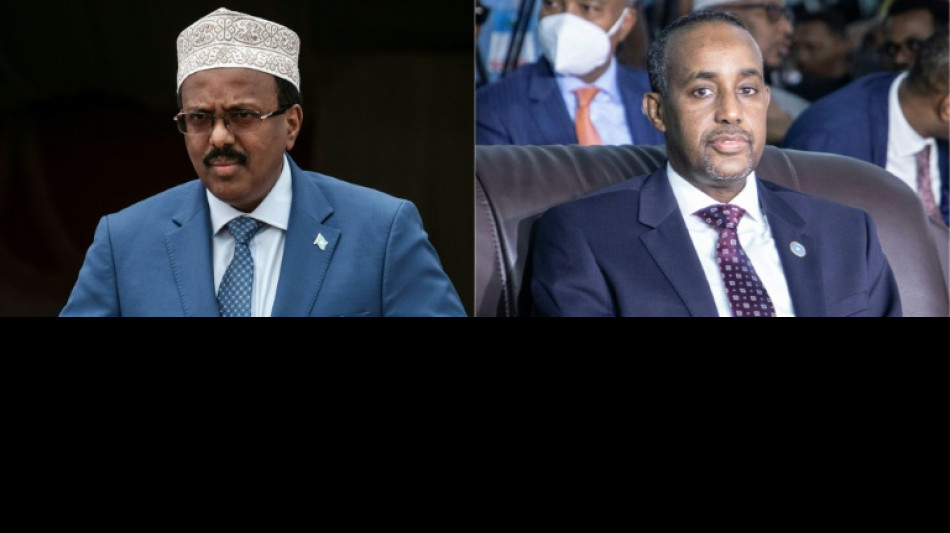
Spat over AU envoy drives new wedge between Somalia's leaders

Somalia's feuding leaders were locked in a fresh dispute Thursday after the prime minister ordered the expulsion of the African Union's envoy -- a move rejected by the president as "illegal".
A power struggle between the two men has hobbled elections and prolonged a political crisis in a country reliant on foreign aid to deal with drought and a violent Islamist insurgency.
The latest bustup erupted when Prime Minister Mohamed Hussein Roble declared AU envoy Francisco Madeira persona non grata "for engaging in acts that are incompatible with his status as representative of the African Union Commission".
In a statement, Roble's office ordered the Mozambican diplomat -- who has been the top AU diplomat in Somalia since 2015 and is in charge of the body's peacekeeping operations there -- to leave the country within 48 hours, but did not elaborate on the reasons.
But the office of President Mohamed Abdullahi Mohamed said it had instructed the foreign ministry to apologise to the AU over the "illegitimate and reckless decision from an unauthorised office."
"The presidency disowns and nullifies the illegal action that threatens our relations with the global international community," it said.
It is not clear who holds sway over the role of the AU representative in the country.
But the presidency said Mohamed, better known by his nickname Farmajo, was the "guardian of the sovereignty" of the state and that it was his role to accept the diplomatic credentials of all foreign envoys.
Farmajo's term expired in February 2021 before fresh elections were held and efforts to remain in power by decree were fiercely opposed and triggered armed clashes in the capital Mogadishu.
To avert a crisis, and under pressure from the international community, he appointed Roble to negotiate a way towards concluding elections in a timely manner.
But the pair squabbled over authority, often embroiling in public quarrels over hirings and firings in the upper ranks of government.
The election has lurched from one crisis to the next, and deadlines have passed unmet.
- Deadly distraction -
Upper house elections concluded in late 2021 and at last count, 247 of 275 seats in the lower chamber of parliament have been decided by clan representatives who choose candidates under Somalia's indirect voting system.
Once sworn in, both houses elect a new president.
But the process is more than a year behind schedule and faces major obstacles in some states. Some results have been cancelled, and others dogged by claims of irregularities and interference.
Meanwhile, millions require urgent humanitarian aid as the Horn of Africa nation reels from one of the worst droughts in decades.
Al-Shabaab, a militant group bent on overthrowing the fragile central government, remains a persistent and deadly threat, and has targeted the election process with violence.
In March, twin bombings killed 48 people in central Somalia, including two lawmakers running for re-election.
Last week, the UN Security Council voted unanimously for a new peacekeeping force to replace the African Union Mission in Somalia (AMISOM) that has been fighting the jihadists for 15 years.
The tortured election process has tested Somalia's weary foreign backers, including its biggest donor the United States, which has imposed travel sanctions over the delays.
Observers say the distractions -- including this latest feud over the AU envoy -- distracts from bigger challenges facing the troubled country.
"It shows that the government is in effect still starkly divided, and that lack of consensus complicates moving forward on anything really, elections included," said Omar Mahmood, an analyst at the International Crisis Group (ICG) think tank.
(L.Kaufmann--BBZ)

 London
London

 Manchester
Manchester
 Glasgow
Glasgow
 Dublin
Dublin
 Belfast
Belfast
 Washington
Washington
 Denver
Denver
 Atlanta
Atlanta
 Dallas
Dallas
 Houston Texas
Houston Texas
 New Orleans
New Orleans
 El Paso
El Paso
 Phoenix
Phoenix
 Los Angeles
Los Angeles



